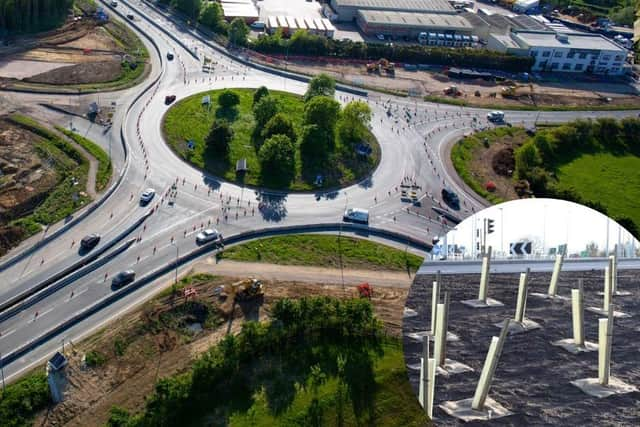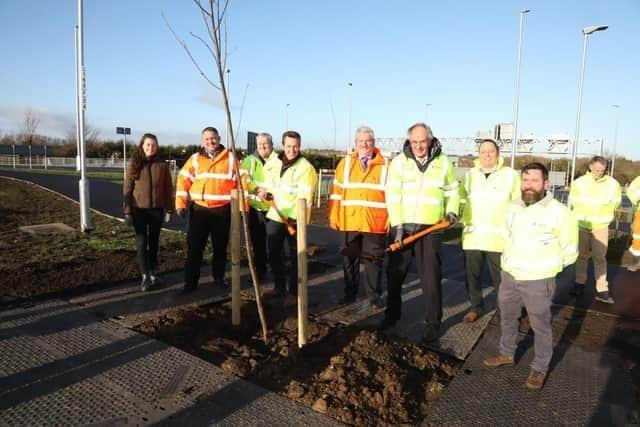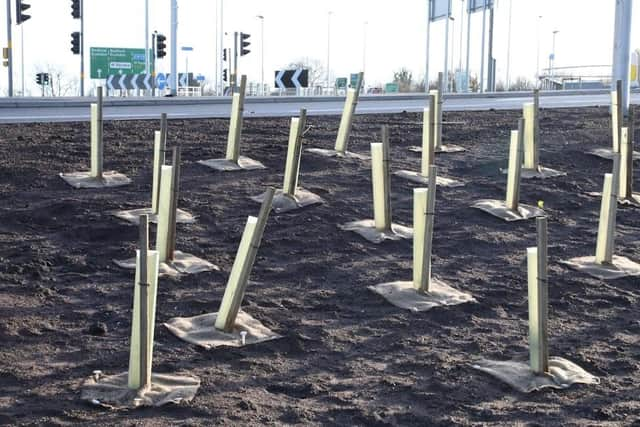National Highways says 'prolonged period' of hot and dry weather may have caused death of newly planted trees at Chowns Mill
and live on Freeview channel 276
National Highways says a ‘prolonged period’ of hot and dry weather may be to blame for the loss of newly planted trees at Chowns Mill near Irthlingborough.
MP for Corby and East Northants Tom Pursglove vowed to raise the issue with National Highways after The Times reported on a Freedom of Information response revealing how many trees planted in roadwork schemes have died.
Advertisement
Hide AdAdvertisement
Hide AdIt included the loss of some trees at Chowns Mill, the A45/A6 junction which had been part of a £24m improvement project to ease severe congestion and bottlenecks and to improve safety.


The improvement works started in February 2020 and were completed in December 2021, with a ceremonial tree planting ceremony to mark the occasion.
Mr Pursglove tweeted about the issue in August, saying: “Following The Times newspaper article on newly planted trees dying at the Chowns Mill Roundabout, I’ve written to National Highways today for their insight on why this has occurred, to outline any plans for replanting, & learning to avoid repeat losses.”
Following an investigation that found the trees weren’t sufficiently watered to keep them alive, the MP has tweeted again, saying: “A welcome acknowledgement, but lessons must be learnt about what went wrong with this planting and acted on in future maintenance planning.”
Advertisement
Hide AdAdvertisement
Hide AdThe Northants Telegraph contacted National Highways about the loss of trees at Chowns Mill.


In response, National Highways programme delivery manager, Dean Holloway, said: “We take our responsibility to the environment very seriously and are always exploring ways we can enhance the local landscape.
“Habitats and climate vary widely across the UK and some newly planted trees may die for a variety of reasons, but we are reviewing standards for planting nonetheless.
“We believe a prolonged period of hot and dry weather may have contributed to the loss of some trees at Chowns Mill.
Advertisement
Hide AdAdvertisement
Hide Ad"We are looking to plant new trees and have an aftercare plan which includes the installation of watering bags to provide more frequent and reliable watering.”


National Highways said they conducted a detailed review in the autumn of 2022 to better understand schemes that had a high failure rate and develop a mitigation plan.
Habitats and climate vary widely across the UK.
With the changing climate they said it’s important that they plant the right species in the right places and that they select species of regional provenance that are both climate resilient and enhance surrounding habitats.
To support this, they have taken the approach of buying seed of UK provenance from Forestart and growing their own stocks of native trees - working with Greenwood Plants, near Arundel in West Sussex, one of the UK’s largest growers for the commercial sector.
Advertisement
Hide AdAdvertisement
Hide AdNational Highways also said: “Tree failures generally come from foraging damage by deer, voles, rabbits etc; drying out/drought and problems with soil.
"Some level of establishment-failure is normal and, indeed, the density of planting anticipates this.
"Over the next three decades, we plan to deliver a sustainable road network that protects and enhances the environment, mitigating the impact of England’s busiest roads and ensuring that our land can support nature recovery.
"Our recently published Environmental Sustainability Strategy sets out our vision of a connected country and a thriving environment.”